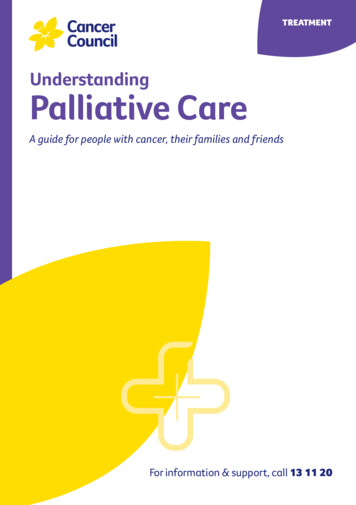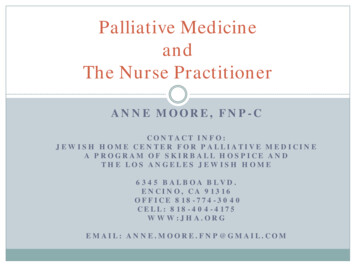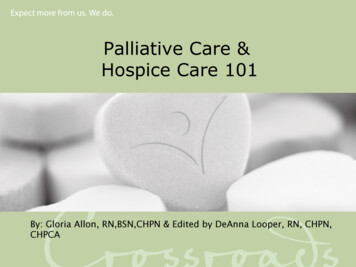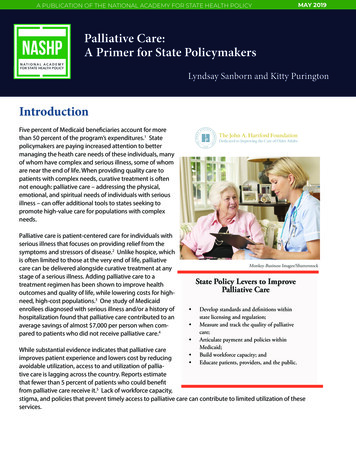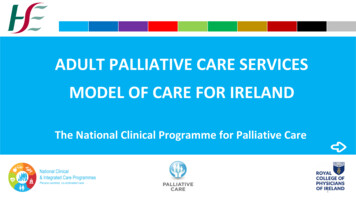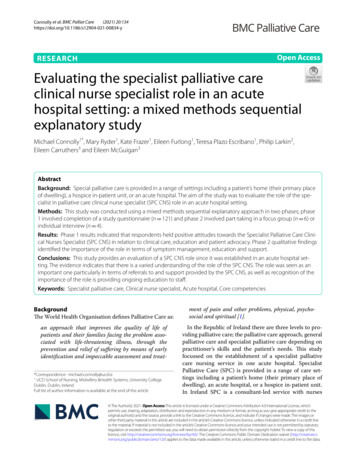
Transcription
(2021) 20:134Connolly et al. BMC Palliat Carehttps://doi.org/10.1186/s12904-021-00834-yOpen AccessRESEARCHEvaluating the specialist palliative careclinical nurse specialist role in an acutehospital setting: a mixed methods sequentialexplanatory studyMichael Connolly1*, Mary Ryder1, Kate Frazer1, Eileen Furlong1, Teresa Plazo Escribano1, Philip Larkin2,Eileen Carruthers3 and Eileen McGuigan3AbstractBackground: Special palliative care is provided in a range of settings including a patient’s home (their primary placeof dwelling), a hospice in-patient unit, or an acute hospital. The aim of the study was to evaluate the role of the specialist in palliative care clinical nurse specialist (SPC CNS) role in an acute hospital setting.Methods: This study was conducted using a mixed methods sequential explanatory approach in two phases; phase1 involved completion of a study questionnaire (n 121) and phase 2 involved part-taking in a focus group (n 6) orindividual interview (n 4).Results: Phase 1 results indicated that respondents held positive attitudes towards the Specialist Palliative Care Clinical Nurses Specialist (SPC CNS) in relation to clinical care, education and patient advocacy. Phase 2 qualitative findingsidentified the importance of the role in terms of symptom management, education and support.Conclusions: This study provides an evaluation of a SPC CNS role since it was established in an acute hospital setting. The evidence indicates that there is a varied understanding of the role of the SPC CNS. The role was seen as animportant one particularly in terms of referrals to and support provided by the SPC CNS, as well as recognition of theimportance of the role is providing ongoing education to staff.Keywords: Specialist palliative care, Clinical nurse specialist, Acute hospital, Core competenciesBackgroundThe World Health Organisation defines Palliative Care as:ment of pain and other problems, physical, psychosocial and spiritual [1].an approach that improves the quality of life ofpatients and their families facing the problem associated with life-threatening illness, through theprevention and relief of suffering by means of earlyidentification and impeccable assessment and treat-In the Republic of Ireland there are three levels to providing palliative care; the palliative care approach, generalpalliative care and specialist palliative care depending onpractitioner’s skills and the patient’s needs. This studyfocussed on the establishment of a specialist palliativecare nursing service in one acute hospital. SpecialistPalliative Care (SPC) is provided in a range of care settings including a patient’s home (their primary place ofdwelling), an acute hospital, or a hospice in-patient unit.In Ireland SPC is a consultant-led service with nurses*Correspondence: michael.connolly@ucd.ie1UCD School of Nursing, Midwifery &Health Systems, University CollegeDublin, Dublin, IrelandFull list of author information is available at the end of the article The Author(s) 2021. Open Access This article is licensed under a Creative Commons Attribution 4.0 International License, whichpermits use, sharing, adaptation, distribution and reproduction in any medium or format, as long as you give appropriate credit to theoriginal author(s) and the source, provide a link to the Creative Commons licence, and indicate if changes were made. The images orother third party material in this article are included in the article’s Creative Commons licence, unless indicated otherwise in a credit lineto the material. If material is not included in the article’s Creative Commons licence and your intended use is not permitted by statutoryregulation or exceeds the permitted use, you will need to obtain permission directly from the copyright holder. To view a copy of thislicence, visit http:// creat iveco mmons. org/ licen ses/ by/4. 0/. The Creative Commons Public Domain Dedication waiver (http:// creat iveco mmons. org/ publi cdoma in/ zero/1. 0/) applies to the data made available in this article, unless otherwise stated in a credit line to the data.
Connolly et al. BMC Palliat Care(2021) 20:134providing direct and largely specialist care. Therefore,specialist palliative care nurses often work independently,albeit as part of a larger multi-disciplinary team, and areseen as a reference point for clinical advice and guidance,planning care, managing discharge planning and familysupport and deal with the breadth of physical, psychosocial and spiritual concerns commonly seen in the contextof palliative and end-of-life care.Specialist nursing roles emerged in Ireland during themillennium following industrial action calling for clinical career progression opportunities for the profession[2]. As an outcome of this report, The National Councilfor Professional Development of Nursing and Midwiferyoutlined two distinct advanced practice nursing roles,Clinical Nurse Specialist (CNS) and Advanced NursePractitioner (ANP) [3]. Consistent with the more recentinternational definition, the CNS role is designed toimprove quality of patient care through the applicationof specialist knowledge and skills to a defined specialistpatient population with established diagnoses [4]. In aclinical focused role the CNS has the authority to amendprescribed patient treatments within agreed protocolsand guidelines, audit practice and evaluate improvementsto the quality of patient care [3]. While the CNS role inIreland has defined requirements and standards for educational preparation, it is not supported by a regulatoryframework with practice standards [5].Internationally, the CNS has evolved over time to meetclinical gaps in patient care. Thus, at times it can be bothdifficult to define the CNS role and clearly articulate theirvalue to the care of patients and families. The CNS is in aunique position that allows them to enhance patient carethrough their involvement in general practice, counselling of staff, education and research, and providing clinical leadership through their consultative role [6–8]. TheCNS is often in contact with patients, their significantothers, other nurses and members of the multidisciplinary team. The CNS is also in regular contact with nursing and hospital management and can see the difficultiesin providing nursing care using the resources available indaily practice. That said, the CNS is also uniquely positioned to prioritize the necessary interventions and initiate solutions to problems at various levels [6–12].Relationships between the CNS and general nursesworking in an acute care environment, are important tooptimize care, so mutual role expectations and conditions are established and maintained so that generalistnurses are empowered and are not de-skilled [13, 14]. Itis important to note that familiarity with the CNS roleand their contribution to care does not guard against thepotential for such dis-empowerment and loss of skills[15]. Evidence suggests that having clear role definitionsand objectives that are clearly communicated to relevantPage 2 of 9staff when introducing new roles, is fundamental to preventing role ambiguity and the likelihood of negativeresponses [6, 16].The clinical nurse specialist role in palliative care hasalso evolved and is evident community palliative careteams and acute hospital services [10, 17, 18]. While thisexpansion in specialist palliative care nursing has beenevident, there is a dearth of evidence on the impact ofthese roles on services, with little serious considerationas to how their role effectiveness might be assessed [6, 14,19–24].To date only a small number of studies have beenundertaken specifically focussing on the SPC CNS. Jacket al. [18] evaluated the impact of the palliative care clinical nurse specialist with doctors and nurses (N 31),within an acute hospital setting. Using semi-structuredinterviews to elicit opinion, they found that the CNS wasbeneficial to both medical and nursing staff. Skilbeck andPayne [25] echoed these findings but were also at painsto point out the significant level of emotional care andsupport that the CNS provides to the patient and theirfamily. Focussing on the evolving role of the communityCNS in palliative care, Husband [26] reaffirmed previous findings regarding the continually evolving role ofthe CNS, with an ever-widening remit including clinical,educational, research and other responsibilities. Husband[26] found that CNS’s easily recognised the importanceof managing both clinical and educational components oftheir role but found it hard to balance the other demands.An important factor to support continued developmentfor the CNS were clearly defined criteria for both therole and their responsibilities. A Northern Ireland basedstudy of community CNS’s in Palliative Care demonstrated that participants found their CNS role stressfuland that both organisational and individual culture influenced both their professional and personal development[27, 28], while Firm et al. [28] in their narrative synthesisconcluded that more integration of specialist palliativecare services and timely sharing of information wouldfurther enhance the relationship of the SPC CNS with thehospital community.In Ireland, Cowman et al. [29] undertook a study toevaluate the role of the CNS in cancer care. Findingsindicated that the CNS was highly educated and perceived to be an active member of the MDT. However, thefindings also demonstrated that the research role neededdevelopment.MethodsThe aim of the study was to evaluate knowledge and perceptions of the role of the specialist palliative care clinicalnurse specialist (SPC CNS) in an acute hospital setting.
Connolly et al. BMC Palliat Care(2021) 20:134This study was conducted using a mixed methodssequential explanatory approach in two phases [29–33];an initial quantitative phase followed by an qualitativephase to explain the initial quantitative results [29].In Phase 1 an anonymised survey of key stakeholders, hospital managers, nurses, nurse managers, doctors and allied health professionals in the hospital wasconducted to identify their knowledge of the SPC CNSrole in providing palliative care. The survey instrumentwas adapted from one used previously by Cowmanet al. [29]. The paper-based questionnaire, with a sealedenvelope, was distributed to the hospital by a gatekeeper who visited the various departments to encourage staff engagement with the research study and thesurvey and collected completed questionnaires. Thegatekeeper works on the palliative care team across thegeographical sector and while known to some staff atthe hospital is not directly employed there. Data wereanalysed using IBM SPSS Statistics 24 and descriptivestatistics are reported.Phase two, aimed to explore issues gleaned from thequantitative phase of data collection providing an opportunity for a deeper understanding of SPC CNS role andthe impact of the role in the study site. Focus groups wereconducted with multi-professional staff who had completed the study questionnaire and expressed a willingness in response to a question to participate in a focusgroup. Potential participants were selected randomlyfrom, 20 individuals who had provided contact details ontheir completed questionnaire. Additionally key stakeholders were invited to participate in an individual interview to evaluate their understanding of the SPC CNS roleand the service provided.Two focus group interviews, with a total of six participants and four individual interviews were conducted. Thefocus group interviews were scheduled to take place in adesignated meeting room at the hospital. On each of theplanned days for the focus group interviews, pressure ofwork meant those who had originally agreed to attendwere unable to do so resulting in a lower than expectednumber of attendees at the focus group interviews. Theduration of interviews was between 20–45 min. Thefocus groups were undertaken in the hospital where thestudy was located. To facilitate individual interviews,three were conducted by phone contact, with the fourthcompleted face to face. An interview schedule was guidedby questions from the survey and was informed by theinitial quantitative analysis and used for both the focusgroup and individual interviews. Each interview wasaudio recorded and all were transcribed verbatim. Qualitative data were analysed using MAXQDA 11. Thematicanalysis of the data enabled the identification of patternsand themes [32].Page 3 of 9ResultsPhase 1A total of 200 questionnaires were distributed to nurses,physicians, and health and social care professionals throughout the study site. 121 questionnaires werereturned yielding a response rate of 61%.Table 1 presents a profile of respondents’ roles with themajority holding nursing roles. Similarly, eleven discreteclinical areas are represented indicating broad participation in the survey. Most respondents had over 11 years ofclinical experience; only a minority (14%) had less than5 years of clinical experience in their role (Table 2).The majority of respondents were aware that SPC CNSwas employed in the hospital (99.2%; n 120) and dataidentified that over fifty percent of respondents (53.7%;n 66) had referred a patient to the SPC CNS in the past12 months.Data showed that the primary reason for referral wassymptom management (71% n 86) with a sizable minority selecting bereavement support (11%; n 14) (Table 3).The data indicated that most referrals to the SPC CNS,across all categories were received from nurses with somereferrals from other health and social care professional.Overall respondents held positive attitudes towards theSPC CNS role especially in relation to clinical care, education and patient advocacy (Table 4). While a majority(78%) indicated that audit and research were core activities of the role.Respondents were asked to rank the core competencesfor SPC CNS. Almost two thirds of respondents rankedclinical competency role as their central core competence(65.3%; n 79). One fifth of respondents selected advocacy as their central core competency (20.7%; n 25)(Table 5).Finally, one third of respondents identified they hadeducation on palliative care provided by the SPC CNSin the past year (33.1%; n 40). It is of note that fewrespondents had any collaboration with the SPC CNSconcerning audit (5%; n 6), research (2.5%; n 3) orquality improvement (7.4%; n 9).Phase two findingsFindings from the qualitative data are presented underthe themes and sub-themes that emerged. The mainthemes emerging were: The role of the specialist palliative care clinical nurse specialist (SPC CNS); Thingsbeing done well, and Competence.The role of the specialist palliative care clinical nursespecialistFocus group and individual interview participants wereasked to reflect on their understanding of the role ofthe specialist palliative care clinical nurse specialist
Connolly et al. BMC Palliat Care(2021) 20:134Page 4 of 9Table 1 Profile of current role and locationFrequency (n 121)PercentageStaff Nurse6452.9Clinical Nurse Manager (1 or 2)1411.6Clinical Nurse Specialist1310.7Senior Nursing Manager (CNM 111 or higher grade)10.8Physiotherapist108.3Doctor (Medical and Surgical)65.032.5108.2121100.0Acute Medical Assessment Unit86.6Acute Surgical65.0Coronary Care Unit32.5Day Ward32.5Emergency Department43.3Intensive Care Unit75.8Medical Ward4234.7Obstetrics and Gynaecology21.7Out-patients Department1512.4Short Stay Unit43.3Surgical Ward1.8Other (specify)2621.5121100.0RoleHealth and Social Care Professionals (e.g. Dietician, Occupational Therapist, Psychologist,Speech and Language Therapist, Social WorkerOther (e.g. specific professional role in hospital identified)TotalLocationTotalTable 2 Duration of clinical experienceYearsFrequencyPercentage 5 years1714.05 to 10 years2319.011 to 20 years3629.8 20 years4537.2Total121100.0Table 3 Reason for advice sought from clinical nurse specialistranked highestReason for adviceFrequency (N 96) PercentageaSymptom Management8671.1Communicating bad news2117.4Bereavement support1411.6Education of staff1915.7Staff support229.1Discharge planning5545.4Other21.6aRespondents selected more than one response(SPC CNS). A varied understanding of the role that theSPC CNS for some respondents. The role was describedas educative and supportive, ‘about advocacy’ – for thepatient and their family, a sense of continuity in care,and was a resource to support the care of patients withcomplex needs:I believe the role is that of, a supportive one, Idon’t see it as that of hands on care. But I see itvery much as being very involved in the patientand family’s care and journey. But through information, through support, through support of thepatient and family but support of other staff members, whether they be nursing, qualified nurses,whether they be health care assistants, whetherthey be junior doctors or indeed whether they beother consultants from other teams. (P5)My understanding of the role is one of advocacynumber one for the patients that we’re lookingafter. And also helping out with the family, the palliative care patient, their family and anybody special to them. (P6)
Connolly et al. BMC Palliat Care(2021) 20:134Page 5 of 9Table 4 Attitudes to clinical nurse specialist roleStrongly agree %/n Agree %/n Somewhat Disagree %/n Stronglyagree %/ndisagree%/nThe CNS in Palliative care has a very important clinical role (n 121)90.1 (109)6.6(8)1.7 (2)0.01.7 (2)10.7 (13)1.7 (2)0.01.7 (2)The CNS in Palliative Care always plays an integral role in staff trainingand education (n 121)68.6 (83)20.7 (25)6.6 (8)1.7 (2)2.5 (3)Audit and research are core activities of the role of CNS in palliativeCare (n 120)82.6 (100)14.0 (17)2.5 (3)0.00.8 (1)40.5 (49)38.0 (46)14.9 (18)4.1 (5)1.7 (2)The CNS in Palliative Care always plays an integral role in patient educa- 86.0 (104)tion (n 121)The CNS in Palliative Care is a patient advocate (n 121)Table 5 Core competence ranked 1st by professional roleClinical %/nAdvocacy %/nConsultation %/nEducation %/nAudit/Research %/nTotal (n)Dietician50.0(1)050.0(1)002Staff Nurse62.5(40)26.6(17)7.8(5)1.6(1)1.6(1)64Clinical Nurse Manager I or II64.3(9)14.3(2)14.3(2)07.1(1)14Clinical Nurse Specialist69.2(9)7.7(1)15.4(2)7.7(1)013Senior Nurse Manager (CNMIII;ADON; DON)100.0(1)00001Medicine – Physician33.3(1)33.3(1)33.3(1)003Medicine – Surgeon100.0 tional tal65.3(79)20.7(25)9.9(12)1.7(2)2.5(3)121While differences in focus on the role of the SPC CNSwas evident, there was general agreement in the context of specific role components. For both focus groupand individual interview participants, symptom management was seen as a key area where the SPC CNSprovided guidance and expert advice: from our perspective we would link in with thepalliative services very much for symptom control So very much you know working side by sidewith palliative care has really been an advantageto some of our clients. (P1)Helping with symptom management, all aspects oftheir care including psychosocial, spiritual, physical etc. (P5)A key aspect of the role of a clinical nurse specialistis the provision of education to both patients and fellow clinicians about a particular condition and howbest to manage it. Clinical Nurse Specialists can drawon their expert knowledge and clinical experience toprovide this education. Education played an importantand central role for the SPC CNS, with participantsseeing this role as the most important in the context ofsupport:I suppose education is paramount, assisting them toassist the patient so giving them the tools they needto look after the patient in the absence of the team.The tools then need to I suppose identify symptomsand how to treat them effectively So there’s a hugeemphasis or there should be a huge emphasis oneducation. (P5)By supporting, encouraging, doing education toreally support the best outcomes for the patientsproceeding whether it would be general palliativecare or specialist. (P6)While education was seen to be important there wasconcern that current provision of education sessions wasad-hoc and needed to be provided in a more formal andstructured way:I suppose the feeling would be from my personal per-
Connolly et al. BMC Palliat Care(2021) 20:134spective is that education is at present very ad hocand at the bed side and in the treatment room orwhatever rather than formal education which I feelis, can only help the patient in the longer run, youknow. So I feel that you know the role could have amuch more active role in teaching and formal education of staff, both medical, nursing and multidisciplinary with regards to symptom management especially of the patients within that cohort. (P5)The supportive role of the SPC CNS in supportingstaff, particularly in the context of the many issues thatarise when managing patients with complex needs andpatients at end-of-life emerged. the support that they give the staff and also thefamily and maybe opening up that conversation andsupporting them in that conversation. (P1) support to ward staff with regards to the care ofpatients as they come towards end of life. (P2)A key component of this support focussed on dischargeplanning particularly when arranging a rapid discharge,to facilitate a person’s wish to die at home. dealing with maybe planning discharge home andsupport in the community and all that sort of thing.(P1)I know previously you know you would dread thethought of a palliative patient going home because itwas such a complex discharge (P3).Things being done wellThere was some agreement among both focus group andindividual interview participants that the SPC CNS service has been a welcome addition to the hospital. The roleof SPC CNS was viewed as an important in the contextof the multidisciplinary team, the provision of personcentred care and strongly advocating for the patient andtheir family:I think you know that MDT approach that they haveis working well. (P5) you know they will advocate for the needs or theyou know the complexity that is going on with thefamily and what might be required or needed forthem it’s safe to say its interacting with the patientand their families, works extremely well. (P6)Participants were asked to consider what if any changesthey might consider making to the current service tomake improvements or assist the ongoing development.For some it was structural changes that were articulated including the provision of a dedicated workspacefor the SPC CNS service. Other considerations includedPage 6 of 9the inclusion of dedicated palliative care beds for admission and management of patient care.The need for greater clarity on the SPC CNS servicerole and the expectations of the service provided wasarticulated by a number of respondents:I think there’s real confusion and lack of clarityabout role expectation. I don’t think that’s anybody’sfault. I think there’s a clear vision but the understanding is lacking There is a disconnect in howthe clinical nurse specialist, nurse managers andthe consultant see the service. And indeed it’s alsovery different to what other clinical nurse specialistsmight believe. So I think where change is needed isan agreed vision of some sort for that role. (P5)I suppose the roles of the nurse has never beenclearly defined within the setting in which SPC CNSrole is. So from the get go . it has been massivelyclinical and I even dare to say massively medical inits approach. (P6)What is evident is that a full understanding of the roleof the SPC CNS is lacking, particularly from consultantphysicians who are the lead clinicians of the multidisciplinary team. Importantly the role of the SPC CNS to beseen as an autonomous practitioner needs to be asserted:I believe as well that consultant colleagues whilstthey value and I know that they value the work of[the SPC CNS service] . I’m not convinced theycompletely understand the role of the clinical nursespecialist. (P5)So it’s very much led by a consultant and I supposethe role of the CNS within that team is much less ofan autonomous role than any other CNS within thehospital. Most of the CNSs within the hospital andthat would be the case throughout the country workautonomously within the speciality in which, theyspeak to and they consult with different members ofthe medical team, not specifically one. (P6)But I think there needs to be what is the word not behandmaidens as much as more autonomous practitioners. (P7)CompetenceCore competencies for the Clinical Nurse Specialist rolesare defined by the NCNM [6] clinical, advocacy, consultation, education, audit and research and participantswere asked to consider the competencies and rate themas either of most or least important.Although responses varied, in general the clinical roleof the SPC CNS was of significant importance, as well asthe advocacy role:
Connolly et al. BMC Palliat Care(2021) 20:134And I think it’s interesting that you say clinicaland advocacy and they are closely linked but youknow you’re very experienced, palliative care nurseis but sometimes you know if you do see a disjointbetween them, you can see that they’re neededtogether but not everyone has the expertise thatpeople like you have, do you know what I’m sayingin both being clinical. (P1)I would say probably clinically, for the patient toknow how the patient is, how the family is copingand I know, I mean the research and audit has tobe done but at the end of the day the consultant isdriving the service, like regards to what the latestresearch is unless the consultant is up with it anddoing it, there’s not much point in me saying wellthis is the latest. (P3)That said participants identified that all competencieswere of equal importance to the role and service andno one competence should be deemed more importantthan any other:Like the clinical the advocacy piece the educationpiece I can’t remember is it audit and researchand their consultant role I see them all as equallyimportant but I don’t see the role as you know Iworry that the role doesn’t have that autonomythat it should have. (P7)The vast majority of participants indicated that auditand research were of least importance to the role of theSPC CNS. However, variance in opinions were voiced.For some research was viewed as a consultant led activity, indicating that the SPC CNS would have a limitedrole in research:I mean the research and audit has to be done butat the end of the day the consultant is driving theservice, like regards to what the latest research isunless the consultant is up with it and doing it,there’s not much point in me saying well this is thelatest. (P3)Audit and research although perceived as important,some felt that this involved a lot of work with no timeto complete it due to the other demands of the role:I suppose auditing, you know what I mean somuch time on the ward, with the patients and allthat, to have to do stuff like paper work and auditis taking [you] away from all of that. So I know it’simportant and I do recognise the importance of theauditing but god you know I’m sure [you’d] behere all hours trying to fit that part in, you knowthe paperwork part of it. (P3)Page 7 of 9Finally, a varying view of competence saw it as primarily focussed on physical symptom management, withsome focus on psychological care, but a total neglect ofspiritual care:You see all this competencies, in my opinion, inpractice they melt down to physical symptom management. And there is maybe a little bit of psychological merit. But the spirit dimension is completelyneglected. (P8)Going further this participant tended to see each of thecore competencies in isolation:I think, to be honest, the difficulty to deliver in allthese competencies. And the result is that doesn’tdeliver in any of the competencies, in a consistentway. If you put too much demand, you only can frustrate the person who does it. And the people who getthe service. (P8)DiscussionThis study provides an evaluation of a SPC CNS role sinceit was established in an acute hospital setting, 18 monthsprior to the commencement of the study. While the evidence presents a varied understanding of the role of theSPC CNS, its importance was strongly reinforced interms of referrals and support provided from both quantitative and qualitative phases.Principal focus for referrals to the SPC CNS were referrals for symptom management, communicating bad newsand bereavement support (Table 3). Overall respondentsheld positive attitudes towards the SPC CNS in relation to clinical care, education and patient advocacy. Aminority of respondents ( 10%) did not value audit andresearch as core activities of the role.Qualitative findings identified the importance of therole in terms of symptom management, education andsupport. The role was viewed primarily as end-of-life careand for management of symptoms. There are opportunities for further development of the role for the management of chronic illness. The role was valued highly andseen as important in the context of the multidisciplinaryteam, and the provision of person-centred care as anadvocate for patients and families.The core competences identified in both the surveyboth focus group and individual interviews emphasisethe importance for symptom management and dischargeplanning. It is not surprising that most referrals and supports were sought by nurses as they are the majority ofrespondents in the study and comprise the majority ofprofessionals working in the hospital.Attitudes to the SPC CNS role were highly positivefor all areas relating to their role from both quantitative
Connolly et al. BMC Palliat Care(2021) 20:134Page 8 of 9and qualitative data. Their clinical role, integration withpatient and staff education were all recognised by a sizable majority of respondents and within qualitative findings with their clinical expertise in knowledge, educationand management of
ceived to be an active member of the MDT. However, the ndings also demonstrated that the research role needed development. Methods e aim of the study was to evaluate knowledge and per-ceptions of the role of the specialist palliative care clinical nurse specialist (SPC CNS) in an acute hospital setting.


